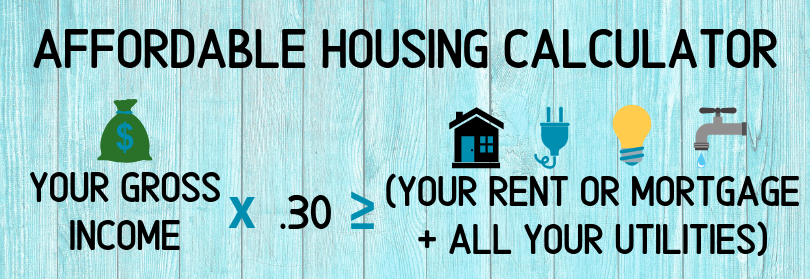During the June Power Breakfast, The H Word, about hurricane recovery, one of the hottest topics to emerge was the lack of affordable housing in our state.
In fact, NC Emergency Management Director, Mike Sprayberry, closed the event with, “Affordable housing is the top priority for emergency management.” When you consider all the life-threatening issues Emergency Management must address, it may seem like a surprising comment.
To make sense of it, let’s start with the definition. Affordable housing is a very general term applied when one’s cost of housing, including utilities, does not exceed thirty percent of one’s gross income. It also implies the housing is safe, sanitary, and all critical systems are functioning.
You may want to use this formula to see if your housing is considered affordable.

If you are preparing to buy a home, check out this calculator.
The open market provides housing that is affordable for many of us. There are few options for those in the lower-wage jobs and on fixed incomes. Families that spend more than thirty percent on housing are considered cost burdened. In our region, nearly one third of all households are considered cost burdened.
When the term “affordable housing” is used in community planning, it typically refers to housing that is affordable for people making a certain percentage of the area median income (AMI) which is calculated annually by HUD, per county, by the number of people living in a household. For example, the City of Wilmington offers funds to help finance the development or rehab of rental housing for those earning up to 80 percent of the median income, which is $58,250 for a family of four.
Why does this matter to emergency management officials?
First of all, communities are more resilient overall when residents at all income levels have housing options and low-income families – who are disproportionately impacted by disasters – have somewhere to go if their homes become uninhabitable.
Secondly, property damage and fatalities can be prevented when all homes are structurally sound enough to withstand severe weather and the homes of people without the resources to leave are located outside of flood hazard areas.
A study by the North Carolina Housing Finance Agency after Hurricane Florence determined there is now only one affordable housing unit for every eight North Carolinians who need it. Specifically, our tri-county region needs nearly 36,000 additional units to keep up with demand.
Pricing low-wage workers out of the local housing market will result in a shortage of personnel in clerical, food service, retail, janitorial, and other critical components of our service economy. Is your business experiencing this?
WARM’s affordable housing strategy is one of the most efficient: preserve what we have. In the context of disaster management, WARM’s mission to repair, rebuild, and make homes safer strengthens homes in disrepair, helping them weather the storm.
After a storm, of course, WARM repairs storm damage so families can return to a home that is affordable to them. Since Hurricane Florence made landfall, we’ve completed 53 rebuilds and have another 28 under construction while 117 families wait in the queue.
By keeping people safe in their own homes, WARM is helping our community recover from Hurricane Florence and preparing homes to weather future storms. Join the hundreds of people involved in this effort at www.WARMnc.org
JC Lyle has served as WARM’s Executive Director since January 2009. Under her leadership, WARM's annual revenue and productivity have more than quadrupled. Prior to working in the nonprofit sector, Lyle worked at McKim & Creed on subdivision design, rezoning and permitting throughout coastal North Carolina. Lyle earned her Master of Business Administration from UNCW's Cameron School of Business and has presented workshops on affordable housing issues and nonprofit management at state-level conferences. Lyle serves on the Planning Commission for the City of Wilmington and the North Carolina Housing Partnership, the board that oversees the state's housing trust fund. In 2012, Lyle was named Wilma Magazine's first Woman to Watch in the Nonprofit Category. In 2014, she accepted WARM's Coastal Entrepreneur Award in the Nonprofit Category, given by the Greater Wilmington Business Journal and UNCW’s Center for Innovation and Entrepreneurship. In 2018, the Association of Fundraising Professionals, Cape Fear Chapter named her Outstanding Fundraiser of the Year.
City Club, Event Center On The Market For $7.5 Million
Emma Dill
-
Apr 16, 2024
|
|
Wilmington Tech Company Tapped For Federal Forestry Contract
Audrey Elsberry
-
Apr 15, 2024
|
|
Commercial Real Estate Firm Promotes Adams, Mitchell To Vice President Roles
Staff Reports
-
Apr 16, 2024
|
|
New Hanover Industrial Park To Get $3.3M In Incentives For Expansion, New Jobs
Emma Dill
-
Apr 15, 2024
|
|
Gravette Named Executive Director Of Nir Family YMCA
Staff Reports
-
Apr 16, 2024
|
|

“Our little town, especially the mainland area, is growing by leaps and bounds. So having somewhere else besides the beach for kids to go an...

Lydia Thomas, program manager for the Center for Innovation and Entrepreneurship at UNCW, shares her top info and tech picks....

With millions in committed funding from New Hanover County and the New Hanover Community Endowment, along with a land donation from the city...
The 2024 WilmingtonBiz: Book on Business is an annual publication showcasing the Wilmington region as a center of business.
